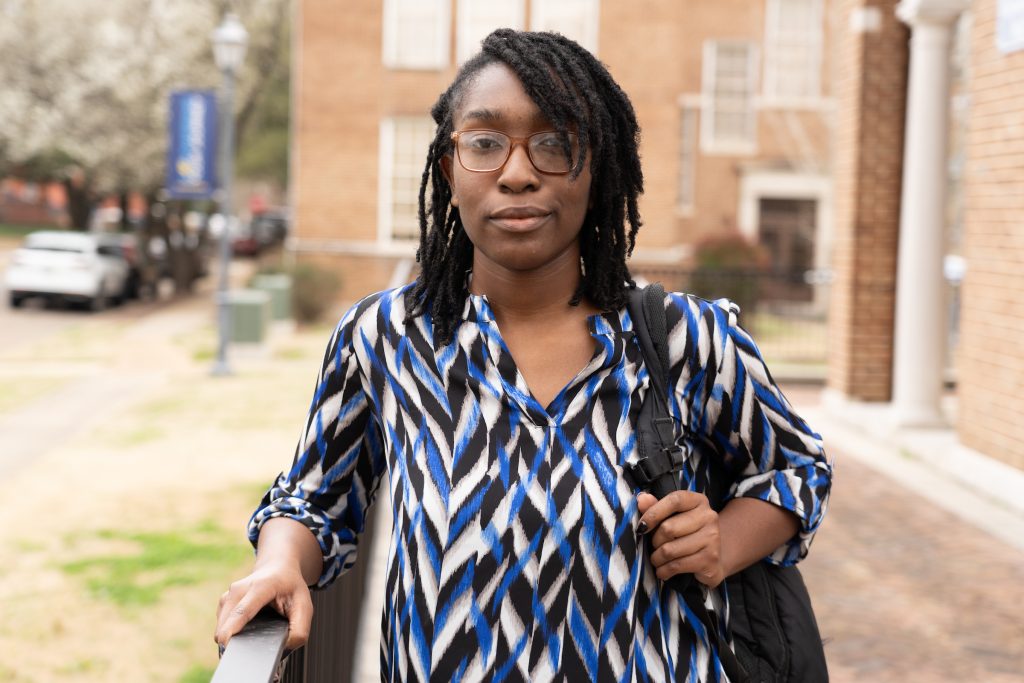Telling the untold: Hargrove’s capstone project tackles African American education, a local school lost to time

The fall of 2022 turned out to be an important one for Mississippi University for Women senior Frederica Hargrove, they just didn’t know it at the time.
“My Introduction to Public History instructor assigned me to discover a piece of local history that I believed deserved to be a historic landmark. At first, I thought the task somewhat impossible because everything noteworthy seemed to have already been ascribed to a historic landmark. I had nowhere to start, so I asked for my family and community members’ opinions,” Hargrove said.
It was in these talks with community members that a certain school, Concord, repeatedly came up.
Concord School was an equalization school, an African American school during segregation, which was shut down in the 1969-70 school year as it was transitioned into New Hope School.
Hargrove knew they were on to something important, and thus was the birth of their capstone project.
Hargrove’s project is two tiered. First, they review African American education from Reconstruction through the mandatory desegregation of the 70s. The second part, which localizes it, examines the perspectives of three black students who attended Concord.
“My main goal was to explore the complexities of African American education, to understand how education operated as an integral aspect to them and to highlight the continuous effort of a marginalized community against the previous preconceptions of Black pre-desegregation schools as a solely failing institution. I hope that my research can shed light on our local history and allow people the tools to view segregated black public schools in a manner that recognizes the endless efforts of a community to thrive under oppression. Their stories should not be allowed to fade into the background. Every piece of Black local history serves a purpose in understanding today’s social environment,” Hargrove said.
This was the trickier aspect of their research too. There was a plethora of information available regarding black education as a whole, but Concord was another story. There was very limited information available to sift through.
“The research for the paper’s first half was a breeze. Many great scholars, such as Charles C. Bolton, extensively cover the topic of Black education in Mississippi and the Deep South. However, the trouble became apparent as I tried to maximize the minimized history here in Lowndes County. After multiple trips to the local archives, I came up short in material,” Hargrove said.
It soon became apparent what they would have to do. It was time to create the sources. This meant talking to people who attended the school and getting first-hand accounts of the history.
“Creating and gathering the resources for an oral history project can be daunting and time-intensive, and a few times, I almost thought I would never get the project off the ground. Yet, a fire lit under me when I finally found my footing and started to listen to the elders in my community share their wisdom and tales of hardship. I knew that I needed to contribute something that would be recognition of a forgotten piece of their lives,” Hargrove said.
Along the way, many professors had an impact on Hargrove. Dr. Erin Kempker, Dr. Kristi DiClemente, Dr. Jonathon Hooks and Dr. Tom Velek were each credited with lending their unique skill set to Hargrove’s research.
“My professors were incredibly instrumental in my research. Without their expertise and intricate knowledge in their field of study, I would be at sea. Choosing a favorite professor is difficult, as each offered me a different perspective on history,” Hargrove said.
These professors, and others, are all part of the support system Hargrove built during their time at The W. Time that they say was well spent.
“My time at The W equipped me with the skills to research local history and to find a greater appreciation for the people around me. The smaller classroom size gave me room to breathe as I started a new chapter in my life and career. Everyone in the history department, my professors and my peers have shown me patient kindness, which has changed how I approach society. As someone who lacked the means to express myself fully, the culture of The W cultivated a space for me to do so. I hope, in turn, I can channel their grace into society through my research and as a functioning member in the career field of history,” Hargrove said.